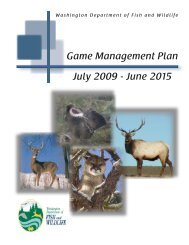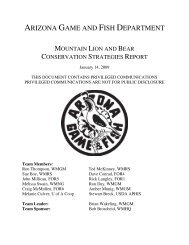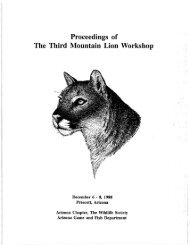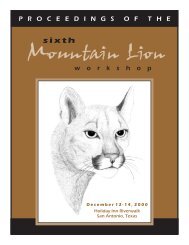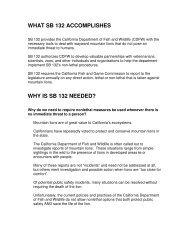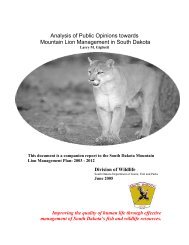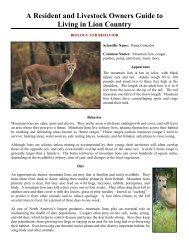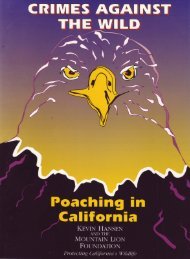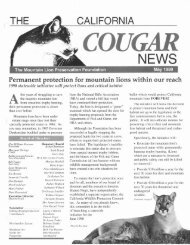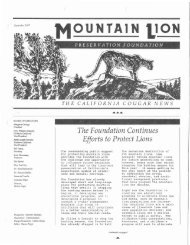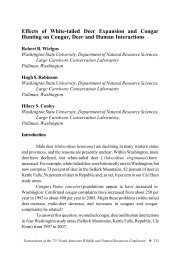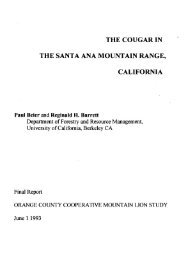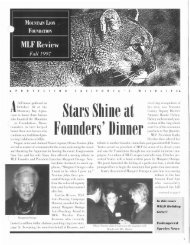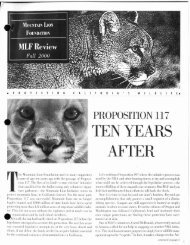Proceedings of the Ninth Mountain Lion Workshop - Carnivore ...
Proceedings of the Ninth Mountain Lion Workshop - Carnivore ...
Proceedings of the Ninth Mountain Lion Workshop - Carnivore ...
Create successful ePaper yourself
Turn your PDF publications into a flip-book with our unique Google optimized e-Paper software.
valuable for generating agency support, fur<strong>the</strong>ring education, and ultimately improving<br />
cougar management.<br />
Two agencies had mandatory hunter education programs (CO and WA) and 2 had<br />
voluntary programs (UT and WY) that assisted hunters in identifying cougars <strong>of</strong> different<br />
sex and age classes. Where hunting with hounds is permitted, sexing and aging cougars<br />
in a tree takes experience, and it becomes increasingly difficult in o<strong>the</strong>r hunting<br />
situations. The importance <strong>of</strong> being able to sex cougars before <strong>the</strong>y are shot may be an<br />
important harvest strategy and can reduce kitten mortality. Regardless <strong>of</strong> <strong>the</strong> structure <strong>of</strong><br />
hunting seasons, agencies may want to consider improving <strong>the</strong>ir efforts to educate<br />
hunters on identifying sex and age <strong>of</strong> cougars and how hunters can help agencies meet<br />
management objectives.<br />
Conclusion<br />
Comparative surveys such as this one are useful for agencies to (1) evaluate cougar<br />
management across jurisdictions, and (2) work to advance management protocols<br />
throughout <strong>the</strong> species’ range. However, this survey was by no means exhaustive. It<br />
would be useful if follow-up surveys were done periodically to keep information current<br />
and readily available. In addition, we encourage o<strong>the</strong>rs to investigate fur<strong>the</strong>r into <strong>the</strong>se<br />
and o<strong>the</strong>r topics to provide a better understanding <strong>of</strong> specific issues that affect cougar<br />
management. Finally, we suggest that agencies use surveys to review management<br />
protocols <strong>of</strong> o<strong>the</strong>r jurisdictions in an effort to encourage a more collaborative approach to<br />
cougar management across jurisdictional boundaries.<br />
Acknowledgements<br />
We thank <strong>the</strong> following agencies and individuals that participated in this survey. They<br />
are: Jim Allen, Alberta Fish and Wildlife; Ron Thompson, Arizona Game and Fish<br />
Department; Douglas Updike, California Department <strong>of</strong> Fish and Game; Jerry Apker,<br />
Colorado Division <strong>of</strong> Wildlife; Rich DeSimone, Montana Fish, Wildlife and Parks;<br />
Darrell Land, Florida Fish and Wildlife Conservation Commission; Steve Nadeau, Idaho<br />
Department <strong>of</strong> Fish and Game; Kevin Lansford, Nevada Department <strong>of</strong> Wildlife; Rick<br />
Winslow, New Mexico Department <strong>of</strong> Fish and Wildlife; Donald Whittaker, Oregon<br />
Department <strong>of</strong> Fish and Wildlife; John Kanta, South Dakota Game; John Young, Texas<br />
Parks and Wildlife Department; Kevin Bunnell, Utah Division <strong>of</strong> Wildlife; Fish and<br />
Parks; Dan Thompson, Wyoming Game and Fish; Carlos A. Lopez Gonzalez,<br />
Universidad Autonoma de Queretaro; Aaron Bueno Cabrera, New Mexico State<br />
University; Rodrigo Nuñez Perez, Proyecto Jaguar; Melito F. Guerra, Instituto de<br />
Ecología; and Claudia Cristina Cinta Magallón. We also thank Brian Kertson and Gary<br />
Koehler who provided comments on an earlier draft.<br />
<strong>Proceedings</strong> <strong>of</strong> <strong>the</strong> <strong>Ninth</strong> <strong>Mountain</strong> <strong>Lion</strong> <strong>Workshop</strong><br />
230



